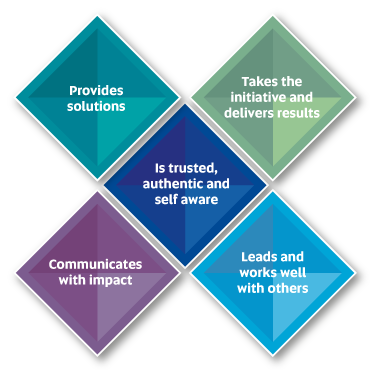Core Attributes of UniSA Staff
Our strategic intent is to differentiate UniSA as a true University of Enterprise. To help achieve this ambition, the University has identified a unique set of core behavioural attributes to guide our development as an enterprising workforce culture.

To exemplify the essence and culture of an enterprise workforce, we aspire that each of our staff will:
- Be trusted, authentic and self-aware
- Take the initiative and deliver results
- Provide solutions
- Communicate with impact
- Lead and work well with others
These five attributes are being progressively incorporated into all of our recruitment, professional development and performance management processes.
Trusted, authentic and self-aware
- Displays appropriate knowledge and expertise and a willingness to share ideas and skills
- Understands own strengths and limits and engages in continuous learning and development
- Exercises sound judgement and acts with honesty, consistency and integrity
- Is dependable; takes responsibility for personal performance and honours commitments
- Shows respect for others and interacts in a way that generates confidence in self and in the workplace
- Reaches out to be helpful and responsive
- Maintains confidentiality as required
Takes the initiative and delivers results
- Has courage to make things happen and the passion to achieve their best
- Seizes opportunities and takes calculated risks
- Strives to understand and satisfy customer or client needs
- Works effectively in a variety of situations and is willing to persist despite ambiguity or obstacles
- Acts to improve a situation without waiting for explicit instructions
- Seeks innovative, effective and efficient approaches to completing goals or tasks
- Works within, and to, the limits of authority to achieve goals
Provides solutions
- Analyses problems and recommends solutions rather than just identifying the problem
- Demonstrates logical, creative and innovative thinking
- Makes clear, transparent and timely decisions
- Identifies priorities for action and stays focused until critical problems are resolved
- Values the input and expertise of others
- Recognises the implications and impact of solutions
- Acknowledges when they don’t know something and takes steps to find out
Communicates with impact
- Communicates with clarity, conviction and enthusiasm, tailored to the audience and situation
- Actively listens and seeks to understand and to be understood
- Chooses the best communication medium for the message
- Keeps people informed
- Shows tact and diplomacy
- Displays sensitivity to diversity and gender equity
- Influences others, creating recognition and support for ideas or to achieve common goals
Leads and works well with others
- Leads by example; demonstrates commitment, courage, energy and tenacity
- Is resilient, nimble and adaptive to change
- Seeks to understand the bigger picture and the impact and opportunities this brings
- Speaks up when an issue needs to be heard
- Builds great working relationships and motivates others to accomplish common goals
- Is flexible and willing to step out of comfort zone to support the team
- Gives and seeks reasonable and constructive feedback
- Seeks new alliances to expand sphere of influence and enhance quality of work
- Champions a one team culture built on respect, trust, collaboration, shared understanding and purpose
The final attribute (5) interprets leadership as a process that can be made manifest in any role, not just in a formal senior or supervisory position.
Resources and references
See Descriptors for Professional Staff (PDF, 0.3MB) to access more detailed descriptors for each professional classification level.
If you would like further information please contact the People & Organisational Development team. PTC welcomes any feedback on the attributes and how they might be used to further develop our workforce culture.
